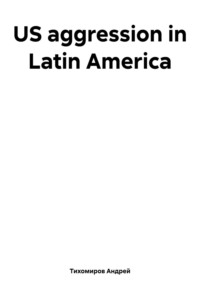Kitobni o'qish: «US aggression in Latin America»
US aggression in Latin America in the 19th century
Latin America is the collective name for American countries and territories that officially use the Romance languages: Spanish, Portuguese and French.
US aggression in Latin America began even before they gained state independence. During the War of Independence in Latin America, the United States captured part of the territories of the rebel Spanish colonies. Later they seized vast territories from Mexico. Soon after its publication in December 1823, the Monroe Doctrine became the main ideological weapon of American expansionists. Behind the words “America for Americans,” the words “America for the USA” sounded more and more clearly.
After the Civil War (1861-1865), having strengthened economically, the United States began to push back the British in the Caribbean. During the Pacific War 1879-1884. they attempted to gain a foothold further south. During the first period of the war, US diplomacy organized protests against the actions of the Chilean fleet off the coast of Peru. By doing this, she tried to ensure trade for the Americans in South America and provide moral support to Peru, as opposed to that provided by the British to Chile.
The defeat of the Peruvians at Tacna and Arica showed the clear superiority of Chile.
The United States understood well that Chile (and, consequently, England) could retain the entire area of nitrate development. On October 22, 1880, the American envoy to Peru, Christiansi, acted as a mediator. He gathered representatives of the warring states on an American warship, which was located near Arica. But the position taken by the envoy (he secretly pushed the allies to demand the return of all conquered territories by the Chileans) did not bring about reconciliation. When the question of concluding a peace treaty arose, the same Christiansi convinced the new Peruvian government of Garcia Calderon that the United States would not allow, even to the point of armed intervention, the dismemberment of Peru. This line is still
Christiansi's replacement, Hurlbut, was conducted more energetically.
Hurlbut's activities were fueled by the personal interest and interest of those American capitalists with whom he was associated. These capitalists, taking into account the impotence of Peru and Bolivia and their desire to find a protector in the United States, developed a plan to create the “Peruvian Company”. The Libyan and Peruvian saltpeter deposits and guano reserves in the territory of already occupied Chile were to pass into her hands. Secretary of State Blaine took part in the scam.
Incited by American diplomacy, Garcia Calderon refused to put his signature on the treaty, which would record the transfer of any part of Peruvian territory to Chile. The Chilean military command arrested him. In Santiago it was stated more decisively than before that the peace treaty must certainly include a clause on the mandatory transfer to Chile of the province of Tarapaca and the possible transfer – under certain conditions – of Tacna and Arica, that is, the entire saltpeter zone. Further crude and uncoordinated attempts by American diplomats to intervene in the dispute only embittered the Chileans and the British behind them, complicating the situation for Bolivia and Peru, whose defenders the United States wanted to appear to be.
The failure that Washington policymakers suffered in Chile did not discourage them. In 1889, at the initiative of the United States, the first Inter-American Conference was held. Secretary of State Blaine openly admitted that by convening it, he pursued the goal of ensuring that the United States would continue to have a dominant position in the markets of Latin America.
Only six years passed and another US Secretary of State, Olney, came up with a new interpretation of the Monroe Doctrine: “Today the United States is virtually the complete ruler of this continent, and its conduct is the law in all those matters in which it interferes. Why? Not because they have feelings of pure friendship or goodwill. Not simply because they are a highly civilized nation, or because prudence, right, and justice invariably characterize the conduct of the United States. The fact is that, along with all other reasons, the incalculable resources of the United States, combined with an isolated position, make them masters of the situation…” This statement was made in 1895 during the Anglo-Venezuelan conflict over the boundary between Venezuela and British Guiana.
Bepul matn qismi tugad.
